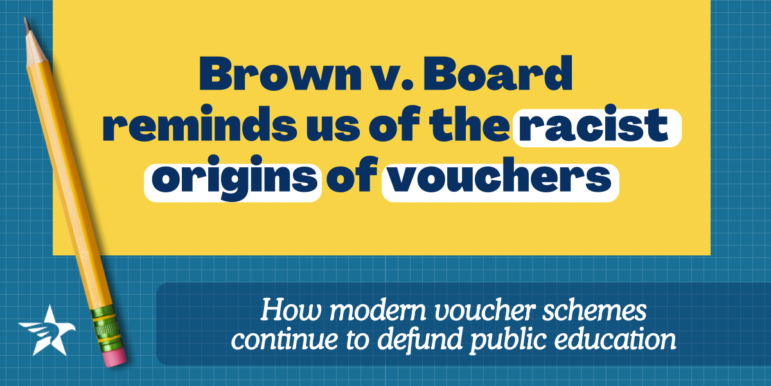Brown v. Board reminds us of the racist origins of vouchers and modern voucher schemes to defund public education.
It’s been 70 years since Brown v. Board of Education, the landmark Supreme Court decision, struck down racial segregation in public schools. The unanimous 1954 ruling declared that segregated schools are “inherently unequal” and a violation of the 14th Amendment’s guarantee of equal protection under the law. This ruling represented a major victory for the Civil Rights Movement and the moral vision of an integrated society with truly equal opportunity for all children, regardless of their race.
More than half a century later, we are sadly still far from the vision of equal educational opportunity laid out in Brown v. Board. Across the country, and right here in Texas, politicians like Governor Greg Abbott are pushing voucher schemes that divert taxpayer funds away from our neighborhood public schools into unaccountable private schools. During the 89th Legislative Session, which is currently happening, the Texas Senate has already passed a voucher scheme.
And that’s just one of the ways state politicians are using their elected power to control the education of future generations. Since the past 88th Legislative Session, public education has seen a wave of various proposals to censor curriculums deemed “controversial,” to blur the line between the separation of church and state, and ban books that talk about race and identity. While politicians attack our local public schools, it’s important for us to remember the very history they’re trying to erase.
Most of us know about Governor Abbott’s push to pass private school vouchers, but it’s likely most don’t know that the push for private school vouchers has its own deeply racist origins rooted in hostility to desegregation and defiance of the Supreme Court’s ruling. In the aftermath of Brown v. Board of Education, segregationist academics and politicians in the South began promoting voucher schemes as a way for white families to obtain public funding to attend racially segregated private schools. Their goal was to leverage public money to perpetuate racial separation and discrimination that the Supreme Court had just outlawed.
Examples of how school voucher programs were used/attempted to be used to bypass the desegregation rulings from Brown v. Board of Education:
- 1957 Texas Legislative session: The Texas House of Representatives passed legislation that would have provided families who pulled their children out of integrated public schools with “tuition grants” to enroll in private segregated academies instead.
- Prince Edward County, Virginia: In 1959, this Virginia county closed down its entire public school system rather than comply with desegregation orders stemming from Brown v. Board. White leaders then created private segregated academies and provided tuition grants supported by state and tax credits (vouchers) to white families so their children could attend these private schools instead of integrated public schools.
- 1954 Georgia Law: Georgia voters backed a state constitutional amendment that enabled the governor to shut down Georgia’s entire public school system if needed to circumvent racial integration orders. While never actually implemented, the law allowed the state to provide vouchers for students to attend private segregated schools instead. It also permitted withholding funding from any public school that attempted to desegregate by allowing white and Black students to be educated together.
A Modern View
Here in Texas, we’re reminded of this ugliness in voucher programs’ origins whenever Abbott and his far-right supporters disingenuously use their “school choice” rhetoric to advance their political agenda. Despite portraying voucher schemes as expanding opportunities for disadvantaged students, school voucher initiatives primarily benefit families already privileged enough to afford expensive private school tuition. Meanwhile, vouchers drain precious money from the public education system that serves the vast majority of Texas students, including most Black and brown children. Instead of fully funding our public schools, vouchers subsidize tuition at private and religious schools that are free to discriminate against students based on disability status, religion, LGBTQIA+ identity, or other characteristics.
TFN recognizes the efforts to privatize public education through vouchers as a direct attack on the very principles of equal opportunity and secular education advocates and experts worked to take a step to protect with Brown v. Board of Education. We want our Texas politicians to fully fund public education as a binding civic institution that brings children of all backgrounds together, rather than reviving discriminatory voucher programs with racist roots.
The unfulfilled promise of Brown v. Board remains a call to action today – to reject voucher programs once and for all that subvert this ruling’s moral vision of equal educational opportunity for all children, in an integrated setting, free from discrimination. We know people power holds great strength in creating the community and future we want for our children. We cannot allow vouchers to resurrect the injustice of a separate and unequal education system. We will not allow it and we know you won’t either.
Want to get involved? Join TFN’s movement to Teach the Truth.
We can connect you with:
- Opportunities to volunteer in your community and school district
- Trainings to become a #TeachTheTruth ambassador to raise awareness about censorship in schools
- Tools and resources to begin organizing in your community
- A network of activists in your community hosting panels, live streams, or group conversations.
Every Texas leader should decisively reject any voucher legislation that undermines an honest, accurate, and quality education. Our neighborhood public schools, and the 5.5 million students they serve, deserve our full investment – not the defunding and discrimination enabled by voucher schemes. Visit our Teach the Truth hub for more resources on how to get involved.
You can also testify against voucher bills alongside Texas Freedom Network! Stay in the Legislative loop by visiting tfn.org/lege.


